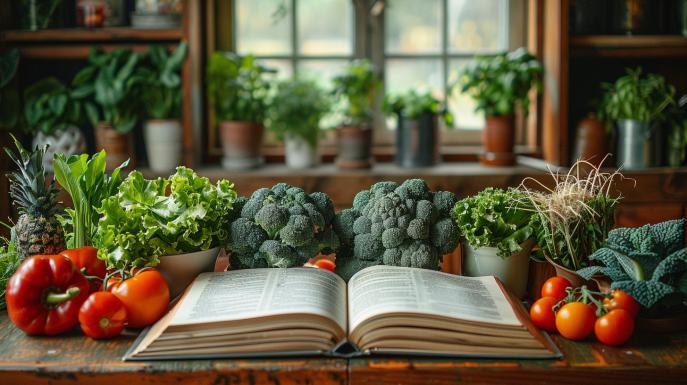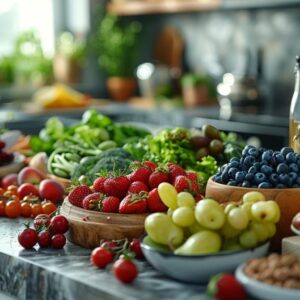Have you ever wondered how organic eating can revolutionize your health and contribute to a greener planet? In our “Complete Guide to Organic Eating: Start Now”, we dive deep into the secrets and benefits of this conscious choice. Discover additional nutrients that embrace your well-being, superfoods that bring a spectrum of antioxidants, and how small steps can connect you to a fuller, more sustainable life. Are you ready to transform your diet and, consequently, your life? Let's go on this nutritious and inspiring journey!
What are organic foods and how do they benefit our health?
Organic foods are grown without the use of synthetic fertilizers, pesticides, growth regulators or genetically modified organisms (GMOs). They promote soil and ecosystem health. Organic foods tend to have higher levels of nutrients, such as antioxidants and omega-3 fatty acids, compared to conventional foods. Organic farming practices contribute to a smaller carbon footprint, better biodiversity and soil health through crop rotation and erosion prevention. Organic superfoods, such as berries and dark leafy greens, can significantly increase your intake of antioxidants and essential nutrients.
How to identify and choose quality organic products?
What are the organic certification seals and what do they mean? Organic quality seals represent product compliance with rigorous production standards without synthetic fertilizers, pesticides, growth regulators or GMOs, in addition to promoting soil conservation and pollution reduction. In South America, for example, the “Orgânico Brasil” seal indicates that the product meets these regulations.
To read labels and identify truly organic foods, look for these certification seals and verify that the ingredients listed are in fact organic. Additionally, [tips for finding organic produce] also include supporting local markets and farmers in your area, who often produce fresh, high-quality organic foods.
What is the environmental impact of organic food production?
Organic production plays a significant role in preserving biodiversity. Sustainable organic agriculture includes practices that maintain and increase biological diversity, such as crop rotation, use of natural inputs, and fostering safe habitats for pollinators and other vital organisms. In Brazil, organic food legislation establishes strict rules that regulate production, aiming to encourage methods that do not harm the environment. Practices such as adequate soil management and the refusal of synthetic chemicals are adopted, resulting in a lower environmental impact.
How to integrate organic food into your lifestyle?
What about start the organic journey today? Start by looking for local markets or organic produce basket subscriptions. This is one of the first steps to incorporating organic foods into your daily diet. As for conservation, store your organics correctly to maintain freshness — many can be stored at the bottom of the refrigerator or in breathable cloth bags. And there is no shortage delicious recipes with organic ingredients to explore; from a simple vibrant salad to more elaborate dishes that include, for example, organic quinoa or heirloom tomatoes. Try starting with some recipes using organic ingredients found here, there are more than ten healthy and creative options that can inspire you.
How to integrate organic food into your lifestyle?
How to start eating organic? Start by gradually replacing conventional items with organic ones, especially those consumed frequently. Take advantage of local markets and fairs focused on organic products. This not only ensures freshness, but also supports responsible local farmers and producers. When prioritizing organic foods, store them appropriately to preserve their shelf life and nutrients. To do this, investigate specific conservation methods for each type of food. Additionally, explore [healthy recipes]() using organic ingredients, which can be found in a variety of online sources and in cookbooks. By making these conscious adjustments, you will not only be benefiting your health with a nutrient-rich diet, but also contributing to sustainable and ethical agricultural practice.
In this article, we explore the essence and benefits of organic foods, delving into the nutrients they provide and the superfoods that can elevate our well-being. We also learned how to recognize and choose quality organic products through trusted seals and labels, and how to find these nutritious gems locally. We evaluate the environmental impact of organic production and the Brazilian laws that encourage these sustainable practices. Finally, we gave tips for skillfully integrating organic foods into everyday life, from storage to the table with appetizing recipes. It is clear: organic food not only nourishes the body but also supports a healthy planet — a choice truly rooted in awareness and care for our health and that of the world in which we live.
FAQ
What are organic foods and what are the health benefits?
Organic foods are grown without synthetic fertilizers, pesticides, or genetically modified organisms; promote benefits to the soil and ecosystems. Regarding health benefits, they tend to have more nutrients, antioxidants and omega-3 fatty acids.How can I identify and choose quality organic foods?
Organic certification seals indicate compliance with organic production standards. To identify quality organic foods, look for such seals on labels and check that the ingredients are truly organic. Another tip is to buy at local markets and support regional producers.What is the environmental impact of organic food production?
Organic food production has a positive environmental impact, including preserving biodiversity and reducing pollution. Organic farming practices include crop rotation and the use of natural inputs, which help maintain ecosystem balance.
How can I incorporate organic foods into my daily routine?
To incorporate organic foods into your diet, start by shopping at local markets or joining organic product baskets. Preserve food correctly to ensure freshness, and explore recipes that use organic ingredients for variety in your diet.What steps can I follow to start consuming organic products?
To start consuming organic products, make a gradual transition by replacing conventional products. Attend local organic fairs and markets, store properly to preserve nutrients, and discover healthy recipes that use organic ingredients, available on online platforms and specialized books.







